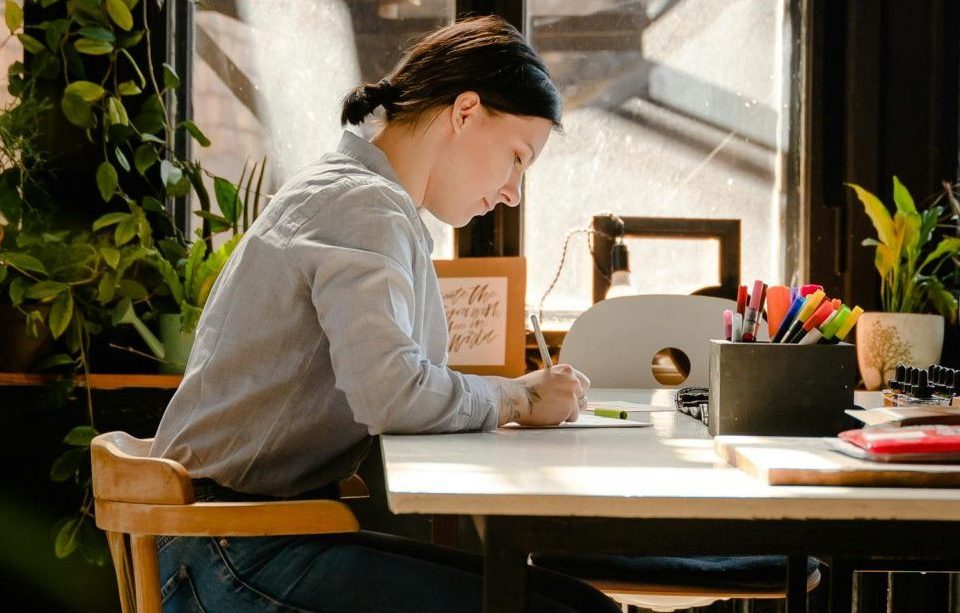


How to Write a Band 6 Creative?
December 13, 2020


HSC Module B: Band 6 Notes on T.S. Eliot’s Poetry
December 16, 2020Full mark Band 6 Creative Writing Sample


Following on from our blog post on how to write creatives, this is a sample of a creative piece written in response to:
“Write a creative piece capturing a moment of tension. Select a theme from Module A, B or C as the
basis of your story.”
The theme chosen was female autonomy from Kate Chopin’s The Awakening (Module C prescribed text).
This creative piece also took inspiration from Cate Kennedy’s Whirlpool.
Snapshot
Part I:
Summer of 2001
For a moment, the momentum she gained galloping in the blossoming garden jolted, and she deflated like a balloon blown by someone suddenly out of breath. A half-smile, captured by the blinking shutter.
Out spluttered the monochrome snapshot. A bit crumpled. A little too bright.
Two dark brown braids, held by clips and bands and flowers, unruliness constrained. The duplicate of her
figure came out in the Polaroid sheltered between a stoic masculine figure, and two younger ones just as unsmiling as their father. The mother stood like a storefront mannequin, the white pallor of her skin unblemished by her lurid maroon blush.
Father told the children that their mother was sick. That’s all. Having nightmares about their grandmother who left mother as a child. “Ran off,” he had said, and his nose twitched violently. “Left a family motherless, wifeless.”
I run, too, the girl had thought excitedly. When she ran, she could see the misty grey of the unyielding
lamp-posts, and hear the same grunts and coos of pigeons unable to sing, melodies half-sang, half-dissonant. Why don’t they ever sing? Like the parrots and the cockatoos and lorikeets?
Out spluttered another photograph.
Void of the many distresses as analogous to adulthood, her face brimmed with childlike innocence, untroubled by the silhouettes of her father and brothers.
Part II:
Spring of 2012
“Can you take a picture for us?”
She was on the other side of the camera, and for a moment she was lost in a transitory evocation of her
childhood. The soft blush of the children and the hardened faces of the adults. The forced tightness of their figures. They too looked happy, she supposed, amidst the golden sand and waves that wash the shore.
Away from the flippancy of clinking wine glasses and high-pitched gossip, she felt could almost hear the ticking seconds of each minute, each hour.
Click.
She returned the phone to the family.
How still they stood! The unmoving figures on the compact screen. A snapshot of the present that has instantaneously become the past. If only her childhood could extend infinitely to her present, and future, then she would again experience that luscious happiness that seemed to ebb with age. The warm embrace by her mother. The over-protectiveness of her father. How strange it was, to think that she had once avoided both.
But no matter.
She can’t return to the past. All she could do is reminisce about it. It was futile, she knew. The physician had told her so.
“Think about the present!” he had said. “You live too much in the past! Talk to your family! Your husband!”. After a glance at the confounded face, he added, “You grew up with caring brothers, I believe?”.
She nodded.
“Surely,” he elongated the word so that it extended into the unforeseeable future, “they must understand.”
No, they didn’t, she thought. Not after their Marmee left.
She remembered how perfect her family had been, captured undyingly on that monochrome photograph. Her brothers and her, mother and father. Yes, what a perfect family. Oh, how the opened eye of the camera would watch apathetically as they fastened together, to perfection.
It all fell apart five weeks afterwards, as they listened her father’s monotonous voice reading the last
remnant of their mother – a note declaring how their perfection had compromised her, been too stifling, just as that Summer’s humidity had been. Wasn’t that what it meant to be a family, she had thought, to let give you to others willingly for the happiness of the entire family?
Absentmindedly, the grown woman picked up a bayberry branch and drew circles upon circles on the siliceous shore. Where it touched, the sand darkened and lightened again as the water rose.
The ultimatum of my life, she proposed to herself, a rebellious dive at sea! Amused by her dramatism, she continued to muse. How simple it would be, washed away and never coming back. Her family now was perfect enough. Big house. Big car. Big parties. Big dreams. But happiness? She thought of the riot of colour and flashing cameras that her husband loved. Oh, how they caused her migraines! And his insistence for her to abandon those childhood passions of hers, strolling amidst sunny afternoons amidst the greenery, only embody their “Marmee” and his “Honey”. How ridiculous!
Her hand halted to a stop.
For a fleeting moment, the continuum of her oblivion terminated, the angular momentum her hand gained by drawing those perfect circles on the shore jolted. She inflated with the sudden realisation of what she had written on the sand.
Celia.
Short, and incomplete without the usual Jennings that followed it. But her name nonetheless.
Yes, those ephemeral imprints of her name will be washed away by the infinite rise and fall of the tide. But she still watched. So that when the present became the past, she would still have a snapshot in her memory to hold on to.
She knew she could not go, just like her name. Into the ocean and never come back. She could not possibly go like her mother, who when she was eleven, left a family without a mother and husband without a wife. She could not possibly go like her mother, who left a daughter crushed by the milliseconds of perfection that succumbs so soon after the click of a camera.
With a long sigh, she turned back and the sea becoming a reverberating picture of her past. Intangible, yet outrageously glorious…
Part III:
11th March, 2015
The mother, on her phone, manicured fingernails swiping the screen absentmindedly. Across the room, the father looked concerned at both the inattentiveness of his wife and the sounds of clanking metal emanating from the cameramen.
“We’re ready, Mrs Jennings,” said one of them, “Please get into position for the family photo!”
The opened eye of the camera watched as the family fastened itself together, the rosy-cheeked daughter and son, the unison of the family creating the epitome of perfection. They smiled vibrant smiles, posed jovially at the flashing lights.
But immediately after the click of the shutters, they all fell apart, insubstantial as a wish.



